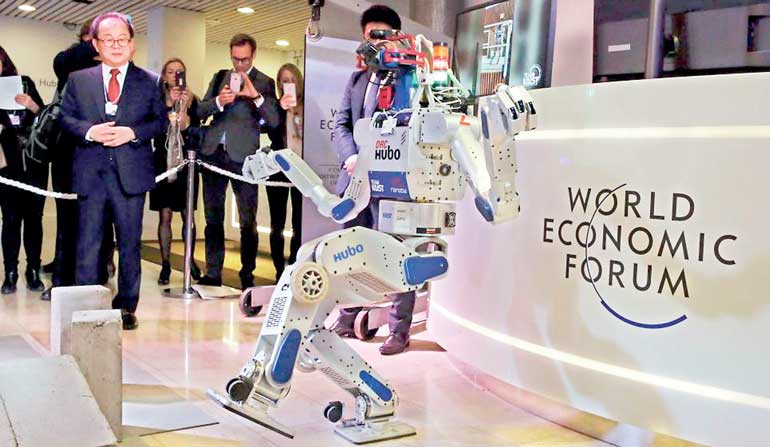Thursday Feb 19, 2026
Thursday Feb 19, 2026
Friday, 22 January 2016 00:00 - - {{hitsCtrl.values.hits}}

 HUBO, a multifunctional walking humanoid robot, performs a demonstration of its capacities next to its developer Oh Jun-Ho, Professor at the Korea Advanced Institute of Science and Technology (KAIST) during the annual meeting of the World Economic Forum (WEF) in Davos, Switzerland 20 January – Reuters
HUBO, a multifunctional walking humanoid robot, performs a demonstration of its capacities next to its developer Oh Jun-Ho, Professor at the Korea Advanced Institute of Science and Technology (KAIST) during the annual meeting of the World Economic Forum (WEF) in Davos, Switzerland 20 January – Reuters
Rapid advances underway across a range of technologies are changing how people live, work and interact with each other, with both positive and negative impact. In a panel at the World Economic Forum Annual Meeting 2016 on the transformations driven by this Fourth Industrial Revolution, government, business and technology leaders stressed the importance of ensuring that dividends are enhanced and divides are bridged.
“Think about the changes in the world happening in terms of hope or fear,” advised Sheryl Sandberg, Chief Operating Officer and Member of the Board of Facebook in the US. “The question that Davos is trying to answer this year is how hopeful or how fearful the world should be. The challenge needs to be to have the triumph of hope over fear.”
Technology can be a great equaliser, noted Paul Kagame, President of the Republic of Rwanda. Even though much of Africa is only starting to reap the benefits of the computer revolution, it is important for the continent to put one foot ahead in this new technological age. “Technology has a huge multiplier effect on finding solutions to many problems by having even the poorest people have access to the technologies that can improve their lives,” he said. But there will be winners and losers in the Fourth Industrial Revolution, he acknowledged. “Our job is to make sure that we narrow the gap and that there are fewer losers and more winners.”
Over 2,500 leaders from business, government, international organizations, civil society, academia, media and the arts are participating in the 46th World Economic Forum Annual Meeting in Davos-Klosters, Switzerland, on 20-23 January. Under the theme, “Mastering the Fourth Industrial Revolution”, the programme comprises over 300 sessions, of which over 100 sessions will be webcast live.
As the Fourth Industrial Revolution gains pace, inclusion is a major concern, argued Meeting Co-Chair Satya Nadella, Chief Executive Officer of Microsoft Corporation, USA. “Is there a digital dividend or a digital divide? That is the right debate to have. The emphasis should be on skills. Rather than worry about jobs being lost, we as a society will have to spend the money to educate people so they can find new jobs.” The key: improve productivity to drive growth and achieve a surplus. “The question is how the dividend is going to get spread,” Nadella asked. “Is it going to spread out geographically, to all sectors of the economy, to help people of different economic strata?”
“Connectivity and data access are too important to keep to the world’s rich,” Sandberg agreed. Taking technology to rural areas will have enormous benefits, stressed Ananda Mahindra, Chairman and Managing Director of Mahindra & Mahindra, India. “If we can make our villages smart, there will be huge productivity gains.” But technology such as mobile phones and artificial intelligence can make people feel disengaged and remote, he said. “There has to be empathy. But how do we programme artificial empathy?”
Technology will drive improvements in governance, said Zachary Bookman, Chief Executive Officer of OpenGov, USA. “One of the things that strikes me about the state of governance in the world is how many broken governments there are,” he observed. With technological advances, “governments will connect much more closely with citizens. They should reflect the citizenry. People should know where tax revenues go, what they are getting for their tax dollars. As digitization of government takes place and new tools reach government, there will be a new governing landscape – much more public, collaborative, integrative and productive.”
The Co-Chairs of the Annual Meeting 2016 are: Mary Barra, Chairman and Chief Executive Officer, General Motors, USA; Sharan Burrow, General Secretary, International Trade Union Confederation (ITUC), Brussels; Satya Nadella, Chief Executive Officer, Microsoft Corporation, USA; Hiroaki Nakanishi, Chairman and Chief Executive Officer, Hitachi, Japan; Tidjane Thiam, Chief Executive Officer, Credit Suisse, Switzerland; and Amira Yahyaoui, Founder and Chair, Al Bawsala, Tunisia.